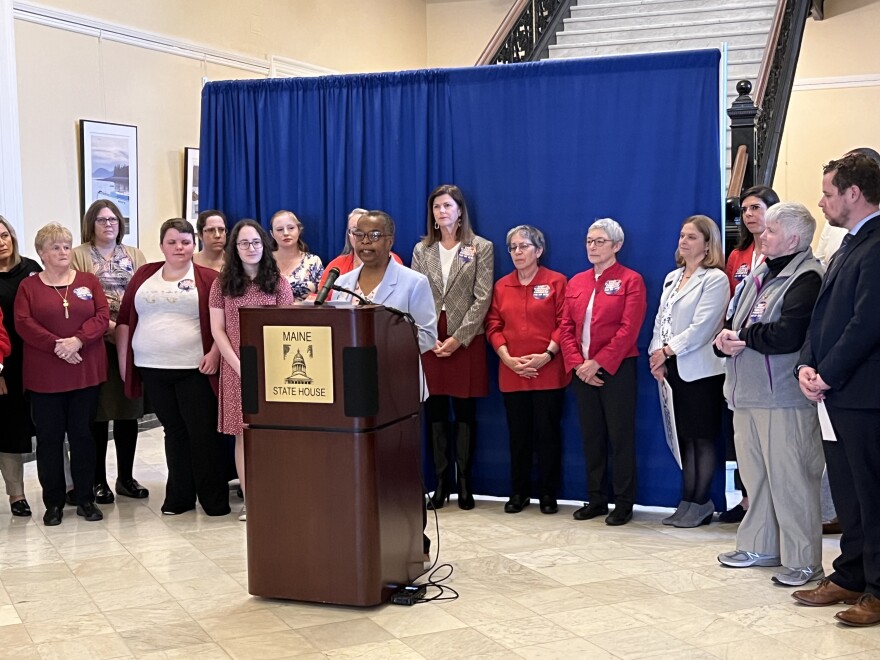Health advocates are once again urging state lawmakers to ban the sale of flavored tobacco and electronic smoking cartridges in Maine, citing a surge in youth vaping in recent years.
But store owners and some former cigarette smokers predict a ban will only harm Maine businesses without benefiting public health.
Lawmakers heard testimony on Tuesday in three bill to ban or restrict the sale of flavored tobacco and vape cartridges. The sponsor of a bill to ban to ban the products, Democratic Sen. Jill Duson of Portland, said her measure would help address health disparities in minority communities while also protecting young adults.
Speaking to the Legislature’s Health and Human Services Committee, Duson cited federal estimates that 85 percent of Black Americans who smoke use menthol cigarettes. Duson said her family, like many others, has “paid the price for tobacco industry’s unfettered, multi-generational targeting of African Americans with menthol-flavored cigarettes and cigars.” Now, Duson accused the industry of using the same marketing strategy to target young people, who studies show are more likely than adults to become addicted to nicotine after starting tobacco use.
"The tobacco industry knows this, of course, and knows too that flavored tobacco products like menthol, mint, candy, fruit and dessert flavors will make it easier for kids to give cigarettes, chewing tobacco and now e-cigarettes or vapes a try," Duson. “There are tens of thousands of these flavored products and four out of five kids who use tobacco started with a flavored product.”
Julia Ryan, a high school senior, was among multiple high school and college-aged students to speak in support of the measures. Ryan vaping is so rampant at her Standish school that she often dreads using the bathroom because the air is filled with the "sickly sweet smell" from the flavored cartridges. Ryan told lawmakers that she's seen the products take a toll on the health and athletic abilities of close friends.
"Many of my peers that use e-cigarettes don't even realize the products have nicotine in them and are highly addictive,” Ryan said. “They think vaping is harmless. Flavors like cherry, cotton candy or spearmint make e-cigarettes and other tobacco products more appealing because don't want the harsh taste of tobacco."
But business owners as well as some former smokers said the bills are targeting the wrong problem.
Peter Brennan with the New England Convenience Store and Energy Marketers Association, an industry trade group that represents convenience store owners, pointed to a 2-year-old ban in Massachusetts that he said cost the state $150 million in revenue. Speaking to reporters during a press conference earlier Tuesday, Brennan called the Massachusetts law “an unmitigated disaster” that has only driven many customers to buy from neighboring states or on the black market.
Christine Peters, the chief operating officer for Maine Smoke Shops, which operates 19 stores in the state, said shops are already vigilant about not selling tobacco or nicotine products to people under age 21.
"Maine retailers are not the issue,” Peters said. “There is a slew of online sites selling to underage minors flavored vapes from China. They do not check IDs like Maine retailers do. We need our legislators to crack down if they are serious about protecting our youth."
Rep. Billy Bob Faulkingham, a Winterport Republican who heads the House GOP caucus, was among several former smokers who said electronic devices were key to him quitting smoking 13 years ago.
“I just think that it’s crazy to target this product,” Faulkingham said. “It’s going to have bad economic effects . . . but it also is not going to improve health. It is doing the opposite of improving health. It is going after a product that helps people stop smoking.”
Lawmakers considered a similar bill to ban flavored tobacco products last legislative session. But it was estimated that measure would reduce tax revenues by nearly $23 million a year and it never even received a vote on the House floor.



